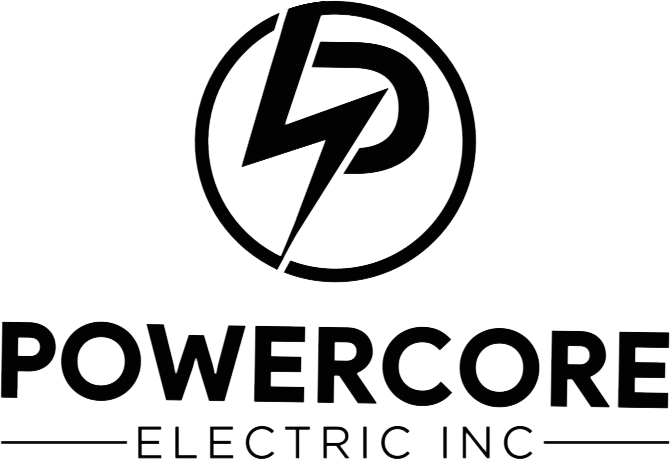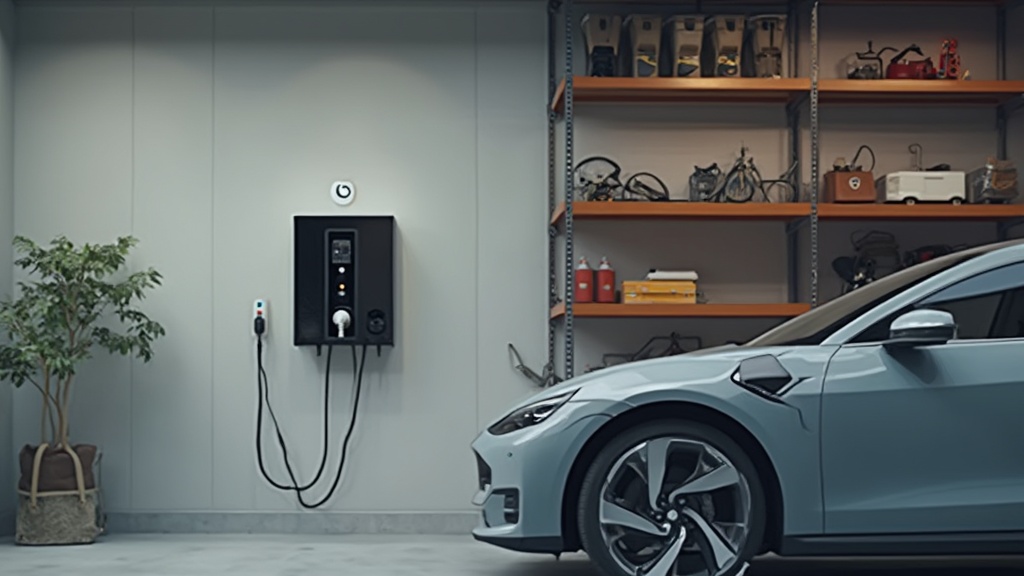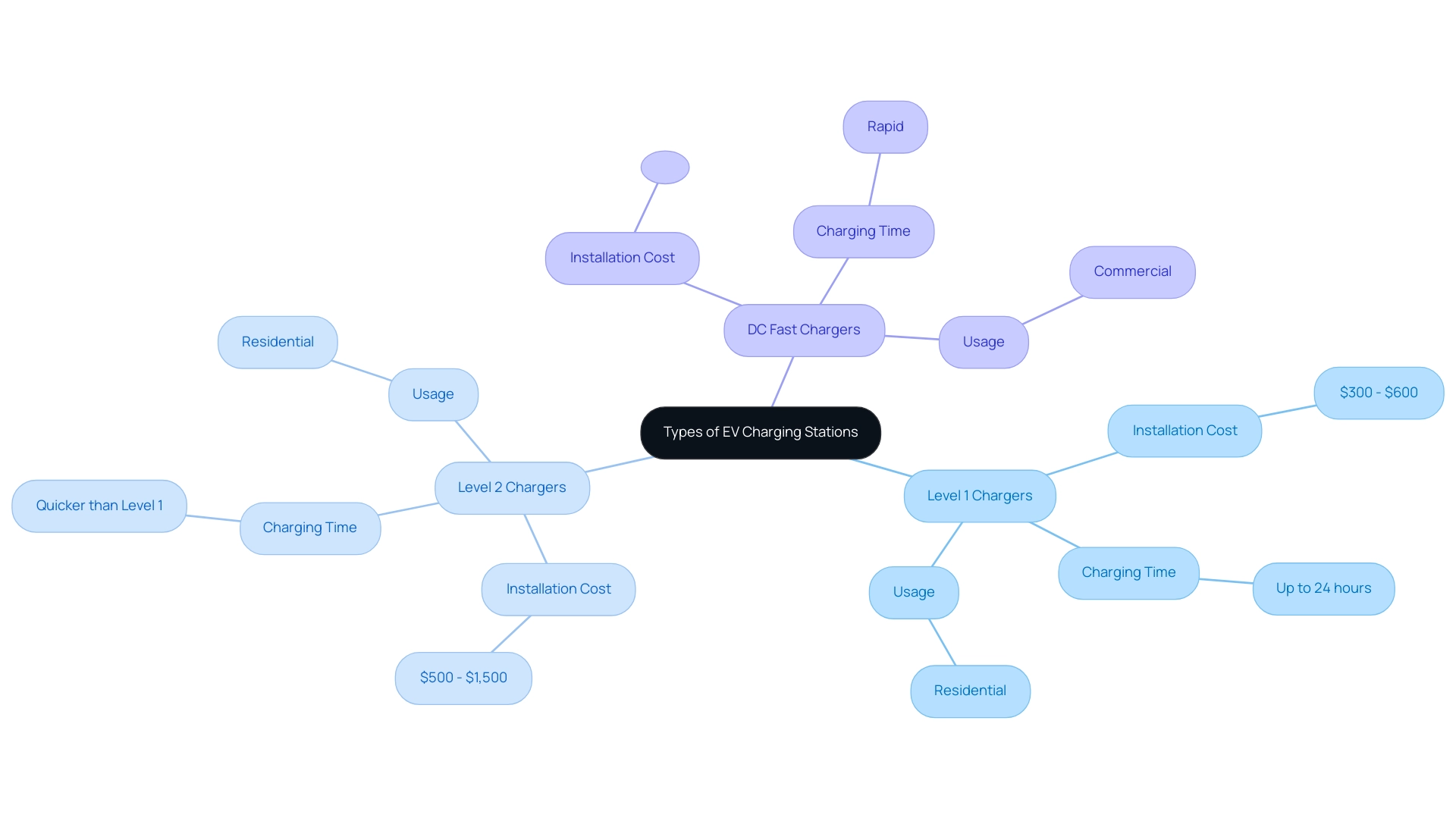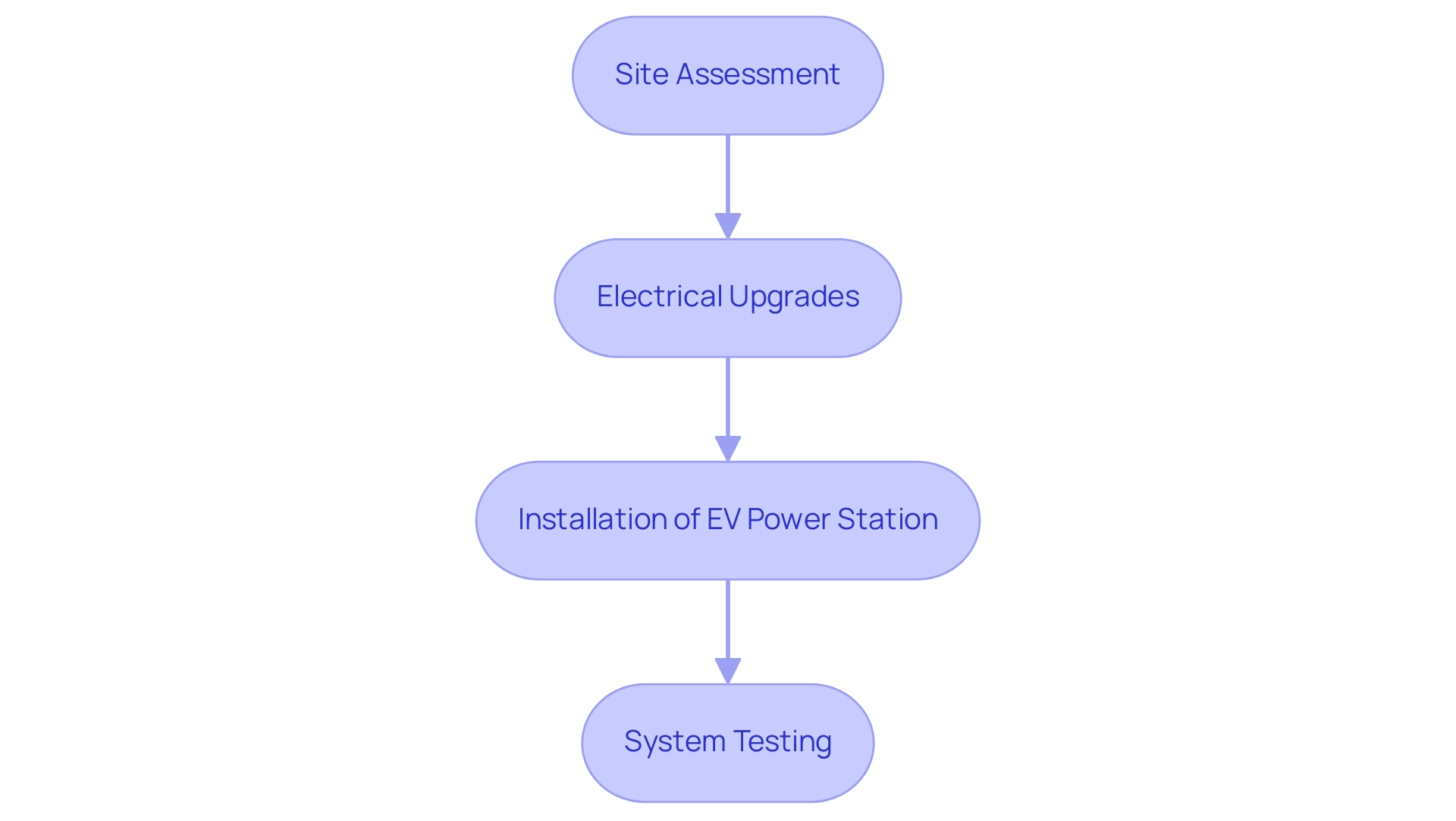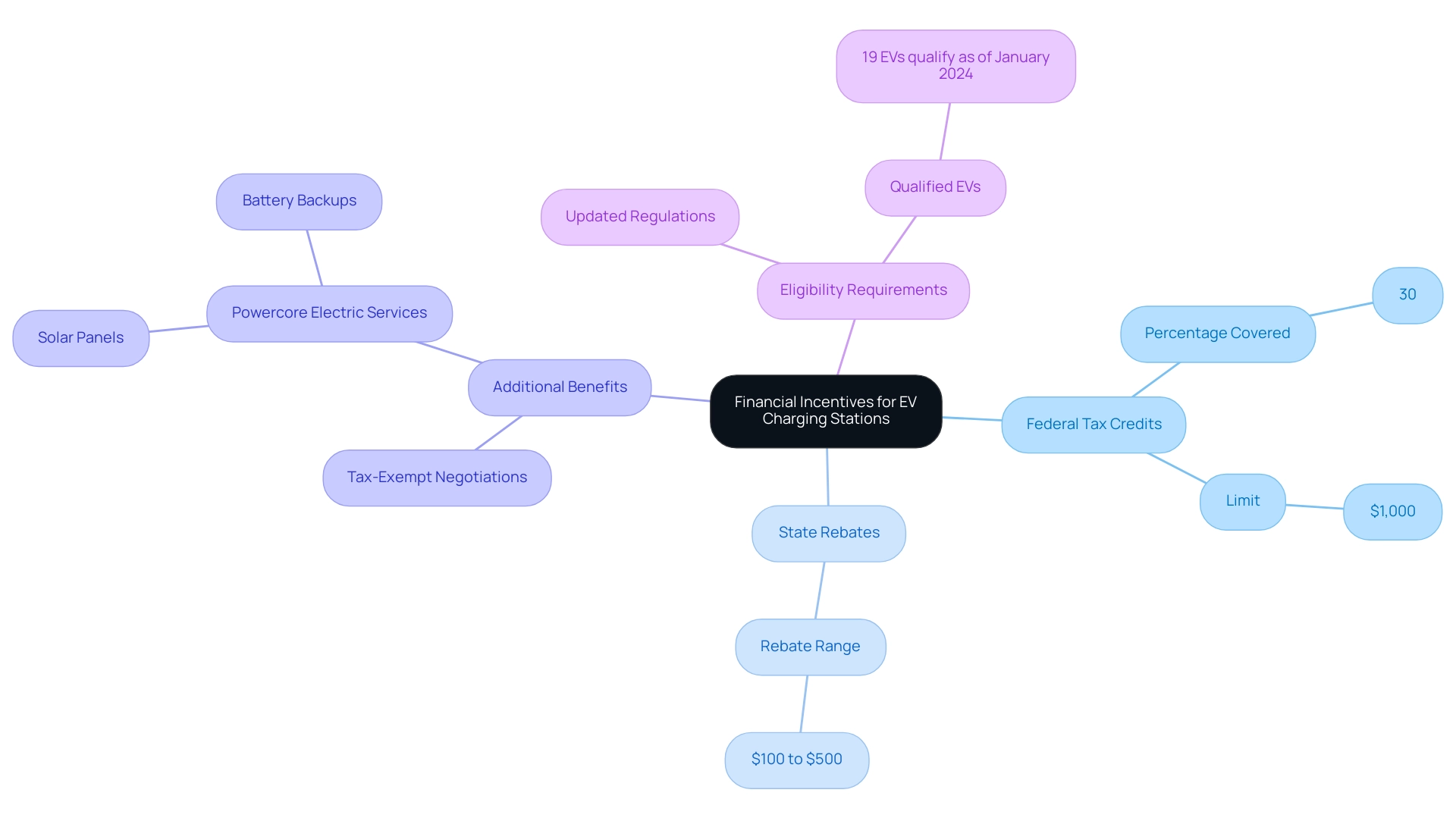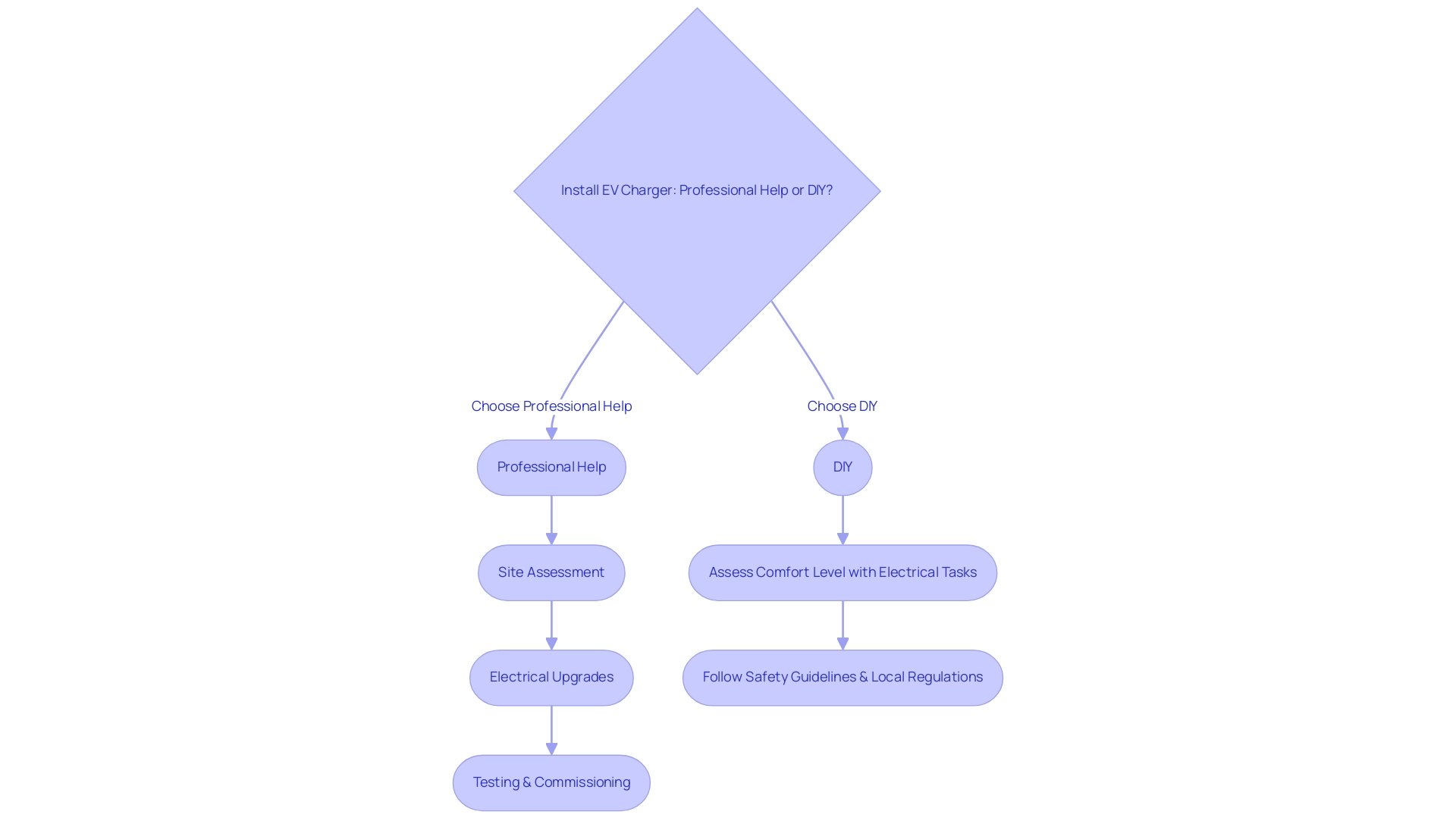Introduction
For homeowners navigating the world of electric vehicle (EV) charging stations, understanding the costs and options available can feel overwhelming. With the growing popularity of EVs, the need for convenient home charging solutions has never been more pressing.
From the budget-friendly Level 1 chargers to the more robust Level 2 options, each choice comes with its own price tag and installation requirements. But it’s not just about the charger itself; additional costs, potential rebates, and tax incentives can all play a significant role in the overall investment.
This article delves into the various aspects of home charging station installation, offering valuable insights into the types of chargers, associated costs, and the financial incentives that can make switching to electric more attainable.
Whether considering a professional installation or a DIY approach, this guide aims to empower homeowners with the knowledge they need to make informed decisions in their journey toward sustainable driving.
Understanding the Cost Range for Home Charging Station Installation
For electric vehicle owners, the cost to install a charging station at home can make installing a home power station a fantastic investment, with expenses typically ranging from $500 to $2,500. However, the cost to install a charging station at home can vary significantly based on several factors, including:
- The type of charging station you choose
- Any necessary electrical upgrades
- Additional features that cater to different needs
For example, Basic Level 1 devices, which can simply be plugged into a standard outlet, usually fall on the lower end of that spectrum.
In contrast, the cost to install a charging station at home for Level 2 devices can increase due to the need for a dedicated circuit and professional installation, resulting in higher labor and material expenses. It’s important to recognize that there is no one-size-fits-all solution for EV chargers; various models and features cater to different needs. Considering that 80% of EV drivers favor the convenience of recharging at home, it’s crucial to do your homework.
Check local pricing and contact professionals, such as Powercore Electric Inc., which focuses on solar panels, battery backups, and EV installations, to obtain a more personalized estimate of the cost to install a charging station at home that is suited to your specific needs. Powercore’s solar panels can lower your energy expenses, while battery backups guarantee you have power even during outages, enhancing the value of your EV power station. Additionally, many governments currently provide incentives to reduce the cost to install a charging station at home, such as tax credits or rebates, so be sure to check with your local government for available programs.
If you are considering EV power options and want a quality installation that’s an investment in your future, contact Powercore Electric Inc. today at (916) 699-8778 or email ryan.serrano@powercoreinc.net to explore how they can assist you in finding the right solution for your home!
Exploring Different Types of EV Charging Stations and Their Costs
When it comes to electric vehicle (EV) charging stations, you really have three main options: Level 1, Level 2, and DC Fast Chargers. Level 1 devices are the simplest, using a standard 120-volt outlet. However, they can take quite a while—up to 24 hours—to fully charge your vehicle, and the cost to install a charging station at home typically ranges between $300 and $600, including setup.
If you’re seeking a quicker alternative, Level 2 units are an excellent option. Operating at 240 volts, they can greatly decrease power-up duration, with the cost to install a charging station at home typically varying from $500 to $1,500 for both the unit and setup. As an additional advantage, approximately 80% of EV operators favor the ease of replenishing their vehicles at residence, rendering Level 2 devices especially attractive.
Powercore Electric Inc. provides professional setup services for these devices, guaranteeing you receive the most dependable arrangement for your home. Now, if you need a rapid charge, DC Fast Chargers are the way to go. These are mainly for commercial use because they come with a hefty price tag—often exceeding $10,000—and aren’t typically installed in residential settings.
It’s also worth mentioning that the federal EV tax credit can offset up to $30,000 of the cost to install a charging station at home, making the transition to EV power sources more financially feasible. When deciding which charger is right for you, consider your daily driving habits and the specific needs of your EV. With the average American driving around 36 miles a day, prioritizing at-home power replenishment really makes sense!
Furthermore, regular maintenance of your power station is crucial for ensuring reliability and safety, as highlighted in case studies that emphasize the importance of upkeep in extending the lifespan of your equipment. Clients have commended Powercore Electric for their smooth setup procedure and knowledgeable personnel, stating, ‘The setup was quick and professional, and now I can charge my EV conveniently at my residence.’ If you have any questions or need assistance, feel free to reach out to Powercore Electric at (916) 699-8778 or via email at Ryan.Serrano@powercore Inc.net.
Additional Costs to Consider When Installing a Charging Station
When preparing to set up an electric vehicle charging point at your residence, it’s crucial to consider more than merely the cost of the device itself. Homeowners should anticipate additional expenses, including the cost to install a charging station at home, that could emerge during the setup process. For instance, obtaining the necessary permits typically costs between $50 and $200, influenced by local regulations.
If your home’s electrical system requires an upgrade to accommodate the device, which is often the case, you might be facing a cost of $500 to $1,500 for a new circuit or panel. Additionally, modifications such as trenching for wiring or setting up a dedicated outlet can contribute to the overall investment. Therefore, it’s a good idea to set aside an extra 10-20% of your total setup budget to cover the cost to install a charging station at home.
Our team at Powercore Electric is here to help you every step of the way. We specialize in the installation of EV power stations, which typically involves a structured process:
- First, we conduct a thorough site assessment to determine the best location for your charger and assess any electrical requirements.
- If necessary, we’ll handle any electrical upgrades to ensure your home is ready.
- Following that, we install the EV power station, ensuring it meets all safety and regulatory standards.
- Finally, we rigorously test the system to make sure it’s functioning optimally before handing it over to you.
It’s also important to note that equipment must be placed in service during the tax year and located in eligible low-income or rural census tracts to qualify for certain incentives.
As Future Energy states, generally, any EV charger that provides 20 kW or more of power is considered level 3, which could be a worthwhile investment for homeowners. Moreover, the Alternative Fuel Vehicle Refueling Property Credit provides eligible companies a 30% tax incentive for the acquisition and setup of EV fueling infrastructure, enabling them to obtain up to $100,000 in tax benefits. As the number of electric vehicles on the road is projected to soar to 42 million by 2030, being prepared for these expenses can make the transition to EV ownership a lot smoother.
Financial Incentives: Rebates and Tax Credits for EV Charging Stations
As an eco-friendly homeowner, installing an electric vehicle (EV) power station at your residence can come with a range of financial benefits. For example, you might qualify for a federal tax credit that covers up to 30% of your setup expenses, with a generous limit of $1,000 for residential configurations. However, it’s essential to stay informed about recent developments, such as the IRS extending federal tax return filing time due to severe storms, which could impact your ability to claim these credits.
Additionally, sellers and installers of electric vehicle infrastructure can be treated as the taxpayer for tax-exempt entities, allowing for negotiation of lower upfront costs for equipment. Many states and local utility companies are also offering rebates that can range from $100 to $500. Gabriella Cruz-Martinez reminds us,
Your tax documents can help you get federal relief faster, the IRS says.
So, it’s wise to check in with your local government and utility providers to uncover the specific programs available in your area. Furthermore, not all EVs qualify for the full tax credit due to updated regulations on material sourcing and manufacturing, so it’s crucial to know which vehicles meet the eligibility requirements. These incentives can significantly reduce the cost to install a charging station at home, making the switch to electric even more appealing.
In addition to EV power stations, Powercore Electric offers services such as solar panels and battery backups, which can further enhance your energy efficiency and sustainability. Ready to make the switch? Contact Powercore Electric today to learn more about our EV charging solutions and how we can help you embrace a cleaner, more sustainable future.
The Installation Process: Professional Help vs. DIY
When you’re contemplating whether to employ an expert or attempt a DIY setup for your electric vehicle (EV) device, it’s crucial to assess your comfort level with electrical tasks. Bringing in a licensed electrician, like those at Powercore Electric, is a smart move. They assist you through a comprehensive setup process that includes:
- A thorough site assessment to determine the best location for your charger
- Any necessary electrical upgrades
- Rigorous testing and commissioning to ensure everything meets safety and regulatory standards
This way, you can avoid potential headaches down the line. On average, professional setup can range from $300 to $1,000, but the cost of an Electric Vehicle Charger has decreased to $799.00 from $1,290.00, reflecting a trend towards more affordable options. Nick Zamanov, head of sales and business development at Cyber Switching, emphasizes that ‘electric vehicles will eventually replace Internal Combustion Engine (ICE) cars,’ highlighting the importance of preparing for the future.
If you’re skilled and self-assured with electrical systems, a DIY setup might save you some cash. Just be sure to follow all safety guidelines and check your local regulations before getting started. Your safety and adherence to building regulations should always take precedence, allowing you to enjoy the convenience of your power station without concerns.
Furthermore, remember to acquire a detailed quote and safety assurances from your contractor, as EV charger setup is customized to meet your specific needs. Powercore Electric also offers comprehensive electrical installation services, including:
- Estimates
- Troubleshooting
- Safety inspections
- Circuit installations
- Surge protection
This ensures a complete solution for your home charging needs.
Conclusion
Navigating the world of home electric vehicle (EV) charging stations can be a daunting experience, but understanding the costs and options available is key to making an informed decision. This article has outlined the various types of chargers, from the budget-friendly Level 1 to the more efficient Level 2 options, and the significant factors that influence installation costs. With prices ranging from $500 to $2,500, it’s crucial to consider not just the charger itself but also potential additional expenses, such as electrical upgrades and installation permits.
Moreover, the financial incentives available, including tax credits and rebates, can greatly alleviate the overall investment. By taking advantage of these benefits, homeowners can make the switch to electric driving more affordable and accessible. Whether opting for professional installation or a DIY approach, understanding the installation process and associated costs is essential for a successful setup.
In summary, investing in a home charging station is not just about convenience; it’s also a step toward a more sustainable future. With the increasing number of electric vehicles on the road, having a reliable charging solution at home is becoming more important than ever. Empowered with the right knowledge, homeowners can confidently embrace the transition to electric vehicles, making a positive impact on both their wallets and the environment.
